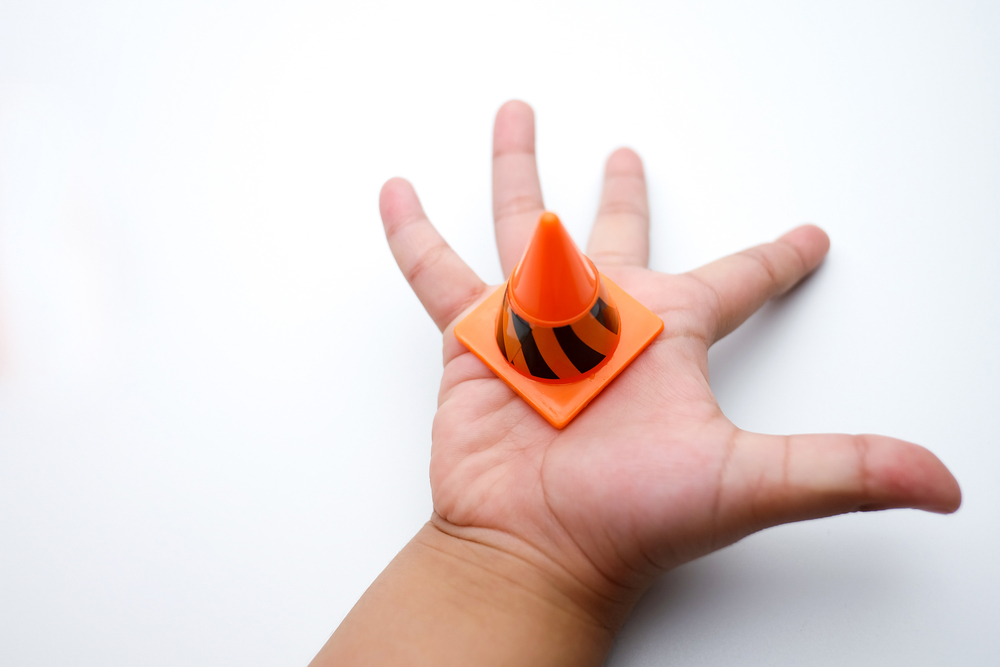Inhaled Toy Triggers 'Traffic Jam' in Lungs 40 Years Later

A 47-year-old British man who was being tested for lung cancer received some good, but unexpected, news: Instead of signs of cancer in the man's lungs, doctors found a tiny Playmobil plastic traffic cone lodged in his airways, according to a new report of the man's case.
The toy turned out to be a part of a set the individual had received — and shortly after, accidentally inhaled — 40 years earlier, according to the case, published Sept. 22 in the journal BMJ Case Reports. Back then, the play set had been given to him for his seventh birthday.
Upon learning of his odd diagnosis, the man said that he did recall putting pieces from the play set in his mouth when he was little. But amazingly, the plastic cone had remained undetected in his lungs for four decades, until it caused a "traffic jam" in his airways and triggered a nagging cough. [27 Oddest Medical Cases]
In the man's case, the long-lost toy was discovered when he sought help from his doctor for a bout of pneumonia. He was an ex-smoker and had smoked about a pack a day for 30 years, according to the case report.
The man's pneumonia was treated with antibiotics, but he continued to have a phlegmy cough, so he was sent to a lung specialist. The lung specialist took an X-ray of the man's chest and saw what he thought were signs of a possible cancerous growth, according to the report.
To investigate further, doctors performed a bronchoscopy, a procedure in which a flexible tube is inserted into the lungs to figure out the cause of blocked airways.
But instead of detecting a tumor, the doctors discovered a tiny plastic object that was partially blocking one of the main airways leading to a section of the man's right lung, said lead author Dr. Nicholas Denny. At the time of the case, Denny was getting his medical training at Wythenshawe Hospital in Manchester, England.
Sign up for the Live Science daily newsletter now
Get the world’s most fascinating discoveries delivered straight to your inbox.
Denny said doctors think that the boy put the plastic traffic cone in his mouth and then accidentally inhaled it, as opposed to swallowing the toy.
After doctors successfully removed the object, it was identified as a plastic Playmobil traffic cone, according to the report of the case.
Lost and found
It may seem unusual that a plastic object — which was, after all, stuck in the man's airways — did not cause symptoms sooner, and so was overlooked for four decades. [11 Weird Things People Have Swallowed]
It's almost certain that the man would have had symptoms as a child, such as coughing or chest pain, immediately after he inhaled the toy, Denny told Live Science, but these symptoms might have been blamed on a short-term illness. And because the toy traffic cone is hollow with holes on either end, it may have allowed for airflow in the passageways of the lungs rather than interfering with it, Denny said.
As the boy got older, the airway may have adapted around the plastic traffic cone, by absorbing the toy into the mucosal lining so that the airway developed around it, Denny said. Although the toy may have caused some obstruction in the airway, it may not have caused any symptoms, he explained.
The man's smoking habits may have also contributed to the delay in detection: Smoking may have suppressed his immune function in the airways, making it more difficult to clear away secretions, such as mucus, and making him more vulnerable to infections, Denny said.
These secretions might have been cleared from a normal airway, Denny said, but in this man's case, the combination of being a long-term smoker along with the partial obstruction from the lodged toy prevented such secretions from being cleared. This buildup of secretions ultimately led to the man developing pneumonia. Two months later, lung specialists finally discovered that the man's symptoms, including the lingering cough, were connected to the inhaled toy.
"On a positive note, his symptoms improved markedly, and he finally found his long-lost Playmobil traffic cone in the very last place he would look [for it]," the case report authors wrote.
Originally published on Live Science.
Cari Nierenberg has been writing about health and wellness topics for online news outlets and print publications for more than two decades. Her work has been published by Live Science, The Washington Post, WebMD, Scientific American, among others. She has a Bachelor of Science degree in nutrition from Cornell University and a Master of Science degree in Nutrition and Communication from Boston University.










